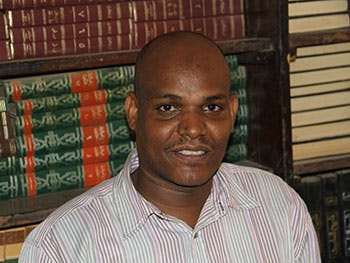SPECIAL REPORTS LAST UPDATED : 17 MARCH 2016

A Birmingham City University graduate played a key role in the defence of Meriam Ibrahim – the Sudanese woman who was sentenced to death because of her Christian faith in May 2014, sparking a global outcry.
Elshareef Ali Mohammed is a lawyer and human rights practitioner, who represents, advises and defends in court victims of human rights violations including women, children and political prisoners. In 2008, he started working as a Human Rights Officer for the United Nations Mission in Sudan, monitoring and reporting on human rights developments, and working closely with government authorities and other agencies working in promoting human rights and rule of law. After training as a lawyer in his native Sudan, he came to Birmingham City University to study LLM International Human Rights, graduating in 2013.
Elshareef spent a year working at the People’s Legal Aid Center in the Sudanese capital Khartoum, where he represented, advised and defended in court various victims of human rights violation including women, children and political prisoners. He then moved to head up the organisation’s field office in the town of Zalingei, in the troubled state of Darfur.
Having worked as a lawyer for 18 months, he hit the headlines in 2014 when he was part of the five-man defence team representing Meriam Ibrahim. Meriam was charged with renouncing Islam, a crime under Sudanese law, and sentenced to death by hanging. She became the centre of an international outcry, further fuelled when she was made to give birth to her second child in prison.
The campaign for Meriam’s release was backed by Amnesty International and world leaders, including British Prime Minister David Cameron. Following extensive negotiations, she was allowed to leave the country for Italy – from where she went on to join her husband in the USA – in July 2014.
Elshareef said his interest in human rights stemmed from his upbringing in Sudan, where he saw first-hand the impact that a lack of respect for international standards could have: “I grew up in Sudan during a dictatorship and was always thinking about justice – I saw many people who were arrested, tortured or killed and wanted to be able to do something about that. I decided to become a lawyer, and continued to develop my knowledge during my studies.”
Having received a prestigious Chevening Scholarship from the British government, allowing him to study a postgraduate course in the UK, he was attracted to Birmingham City University by its expertise in human rights issues. While here, he also undertook an internship with Redress, a UK non-governmental organisation (NGO) that helps victims of torture.
“Since I came back to Sudan, I wanted to support people here by becoming a human rights lawyer, and I have represented, advised and defended in the Sudanese courts various victims including women, children and political prisoners, death row inmates.
“I heard about Meriam’s case but at that point, it was not very well-known and she had a lawyer, but not one who was experienced in human rights issues, so I joined the team. There were two sides to my involvement – the legal side, representing her before the court, but just as importantly, campaigning and raising awareness. We started to bring her case to the public by contacting NGOs and the media.
“I was very surprised by the response because the case had been ongoing for quite a while before it started to attract attention, but when we started to get more interest in the USA, the UK and Europe, that helped to put pressure on the Sudanese government. It also helped Meriam to stay strong because she knew people around the world were supporting her.”
As well as providing legal aid initiatives to bring Sudanese law in line with international standards, he has brought cases through the country’s legal system including the Constitutional Court. Elshareef is also co-founder of Sudanese Human Rights initiative, a small NGO established in 2013 to promote and protect human rights in the country, through a network of human rights defenders, lawyers, journalists and human rights activists.
“The community needs a lot of help and support and my own aim is to see Sudan’s legal system brought in line with international human rights standards. It is very hard for us, because many lawyers are blacklisted by the government, but I will not give up and will continue to raise these issues, and bring about change in the proper way.”